SEO
Digital PR Alternatives To Link Building

Key opinion leaders (KOLs) have emerged as influential figures, bridging the gap between experts and influencers to build a site’s reputation.
In this article, I will dive into the nuances of KOLs in digital PR for SEO, underscoring their importance in building a real-world reputation that can influence ranking factors, particularly in specialized fields.
I will use my expert evaluation model to analyze Michael E. Porter, a renowned authority in competitive strategy from Harvard Business School.
Porter’s case shows how internal KOLs can shape discourse, drive brand visibility, and influence SEO ranking factors through their expertise and reputation.
This is why you should use digital PR as an alternative to link building.
Key insights from the article:
- A key opinion leader is a hybrid expert-influencer: A KOL is an expert in a field with the influence of a social media influencer.
- Utilizing shareable content: Leverage KOLs and engaging content to earn backlinks and enhance SEO rankings.
- Earn links and brand search volume: KOLs can write guest articles to earn backlinks and increase brand search volume simultaneously.
- Valuable research studies: Disseminating breakthrough research through KOLs boosts their reputation and establishes them as industry thought leaders.
Let’s begin.
Subject Matter Experts Vs. Influencers
According to Merriam-Webster, an influencer is:
“a person who is able to generate interest in something (such as a consumer product) by posting about it on social media.”
An expert is defined differently as “having, involving, or displaying special skill or knowledge derived from training or experience.”
An influencer may not drive long-term buying decisions but might influence short-term actions or tests. In contrast, an expert influences decisions and actions of important or complex decisions.
The third option is a key opinion leader, which is a hybrid expert & influencer. A KOL has both influence and expert experience in a given field.
If these outcomes are your focus, then keep reading to understand more about KOLs.
What Is A Key Opinion Leader (KOL)?
A key opinion leader is an expert who influences complex and high-value decisions due to their expertise from real-world experiences in a given field.
A KOL typically has a senior role in a company or agency where they actively work in their field.
KOLs influence important decisions and actions in Your Money or Your Life (YMYL) or other complex purchasing decisions.
In my SEJ article, How To Uncover Your Expertise To Become A Journalist’s Source, I provide a not-so-simple expert-evaluation framework for identifying the degree to which an individual is an expert in a specific field.
My expert evaluation model has four key areas.
- Proven expert knowledge: Depth of knowledge from experience & practice with a demonstration of skill.
- Develop influential assets: Develop publications & research that lead to reputation & recognition of influencing other experts.
- Evolving with change: Adapting to feedback from continuous learning that leads to innovative contributions in their field.
- Improve by teaching: Demonstrating problem-solving and communication skills by teaching, mentorship, and consultation.
Use this model to pitch a KOL to the media as an expert source in a specific field.
The next section explains how to use KOLs in SEO and digital PR to impact Google search positively.
3 Ways To Use KOLs In Digital PR For SEO
KOLs are a digital PR alternative to link building. This alternative can help improve the reputation of a site, its content, and the individual or entity behind it.
Digital PR is an alternative to link building because, although certain attributes of backlinks are most certainly ranking factors, the site’s reputation is a broader list of factors.
How the audience engages with a site’s content contributes to this reputation. This engagement can include:
- Sharing and linking to content.
- Mentioning the brand or product and the individuals behind it.
- Searching brands or concepts on Google.
- Using insights from experts to make purchasing decisions (manifests in reviews or shares).
- Integrating insights from an expert’s content to influence writing.
Although an op-ed or guest contributor post from these experts doesn’t directly influence ranking, an expert who is clever can generate ranking signals due to the impact on an audience.
These signals can include the audience taking action like:
- Searching the brand’s name or concepts in Google.
- Linking to or mentioning the brand.
- Returning to a website or a specific article.
- Discussing the brand.
Generating these signals requires more than an article; it also needs an understanding of the audience’s and media’s trending interests.
From a trend analysis, use the article to share linkable and shareable content assets. An effective article could function as:
- A source of unique research.
- A way to distribute unique content assets in a relevant community.
- Explain research in op-eds or guest contributor articles.
Pro Tips
- With digital PR, you might not need any blog content as the reputation of the content can be separate from the reputation of the product or company.
- Sometimes, media trends don’t align with customer interests. This is, unfortunately, a frequent issue. Try to find trends that align with customer and media trends, not just the media.
Let’s examine a key opinion leader whose concepts have influenced my content creation and decision-making, Michael E. Porter.
The Case Of Michael E. Porter
Michael Porter is a leader in competitive strategy and professor emeritus at Harvard University. He’s an economist, researcher, author, advisor, speaker, and teacher.
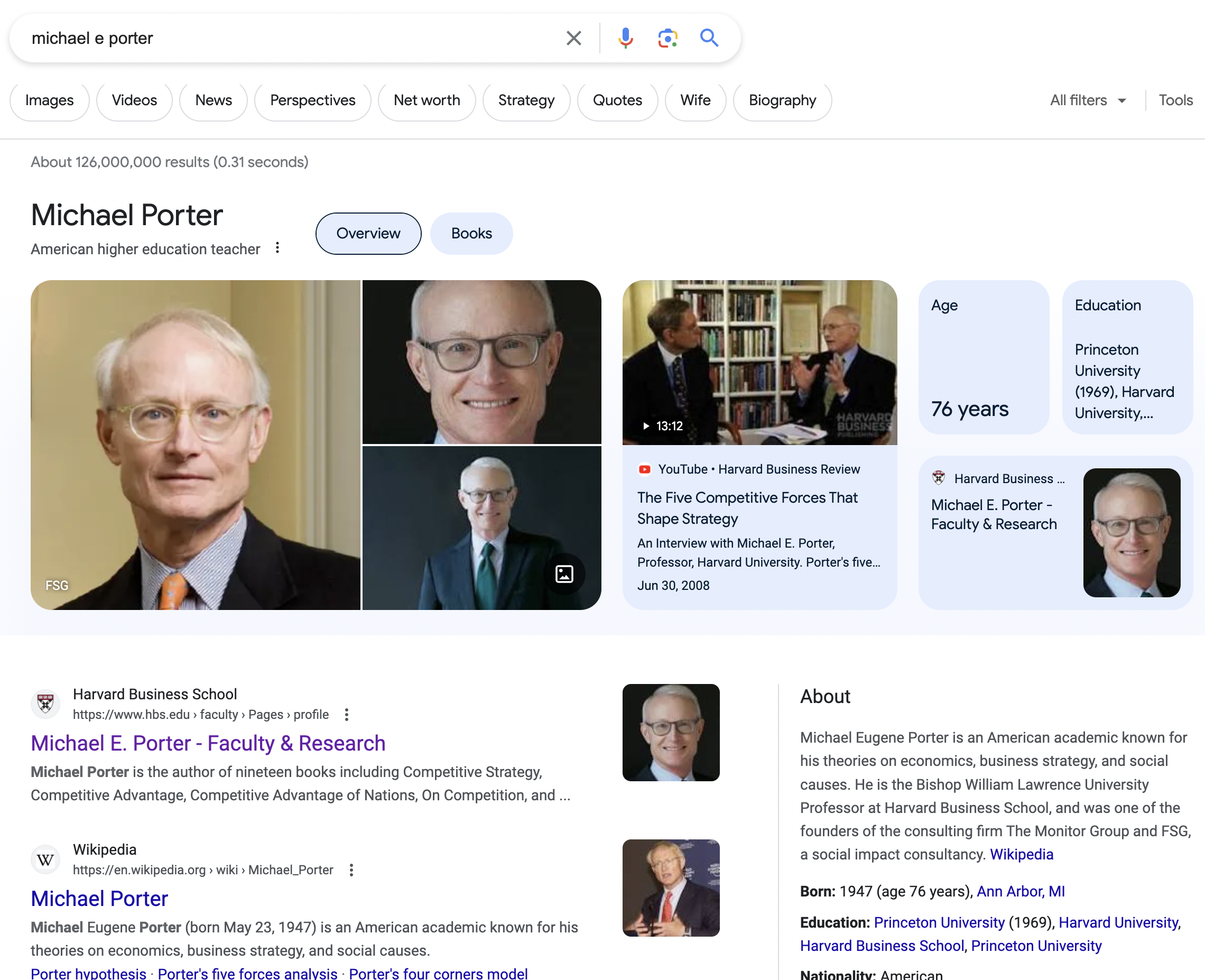
I created an expert evaluation model to identify the attributes and the degree to which a person is an expert. Porter has strong attributes in every aspect of my expert evaluation model.
Proven Expert Knowledge
He has deep knowledge of competitive strategy from extensive research.
His study on competitive strategy in the 1990s is foundational research that explains what constitutes competitive strategy.
Porter wrote about the study in a popular article in the Harvard Business Review called What is Strategy? in 1996.
He went on to perform research in cluster & competition about how competition clusters to a specific geographic region. This is just a sample of his research.
Porter built off his research to demonstrate experience & practice by founding Monitor Deloitte, a business strategy consultancy for senior management of large organizations and government bodies.
The next attribute to evaluate is building influential assets.
Develop Influential Assets
His research and books have driven the strategy for industry and nations. He has written books about competitive strategy based on his early and new research.
These assets have led him to receive numerous awards and honors, like the 2018 McKinsey Award for the best article in Harvard Business Review for How CEOs Manage Time.
Another piece by Porter called The Five Forces that Shape Strategy in Harvard Business Review became a competitive strategy model called Porter’s Five Forces, now a model taught in universities and frequently written about in business training.
50minutes.com even created a pocketbook that summarizes Porter’s Five Forces.
Evolving With Change
He has adapted to feedback from continuous learning that leads to innovative contributions in their field.
Although starting his research in the late 1970s, he has continued to contribute to more recent topics like augmented reality.
Improve By Teaching
Porter demonstrates problem-solving and communication skills through teaching, mentorship, and consultation.
Porter has taught others his research and has continually written about it, which clearly communicates his thought process.
These are the reasons why he’s become a powerful key opinion leader.
If Porter recommends your business or ideas, expect them to influence decisions and the results.
Let’s examine the value he has created for Harvard as a professor and contributor from an SEO perspective. I’ll use Semrush for this examination.
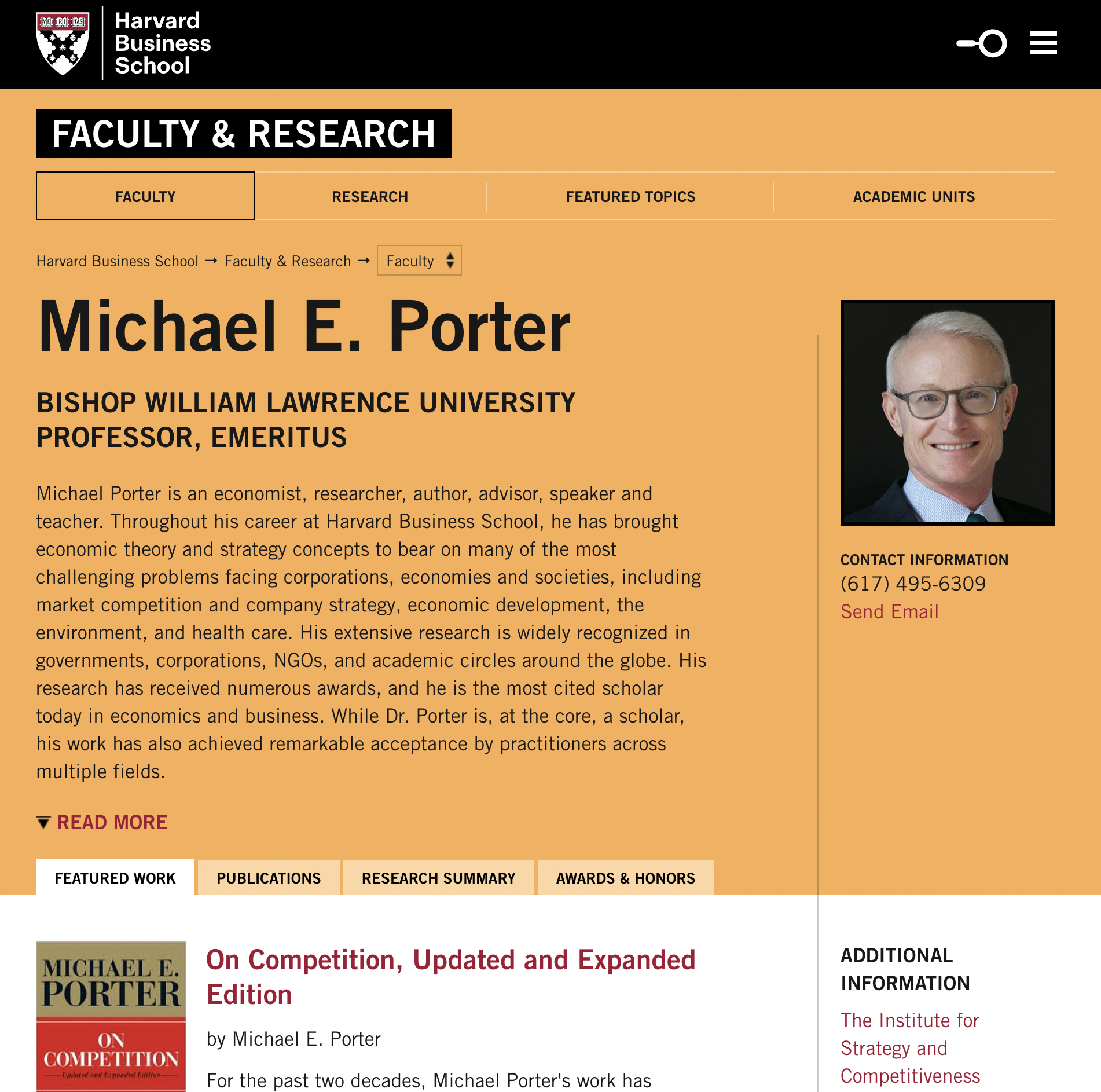 Image from Harvard Business School, January 2024
Image from Harvard Business School, January 2024
Brand Search
Porter’s faculty profile on the Harvard Business School appears for over 153 search variations of the name “Michael Porter” in January 2024.
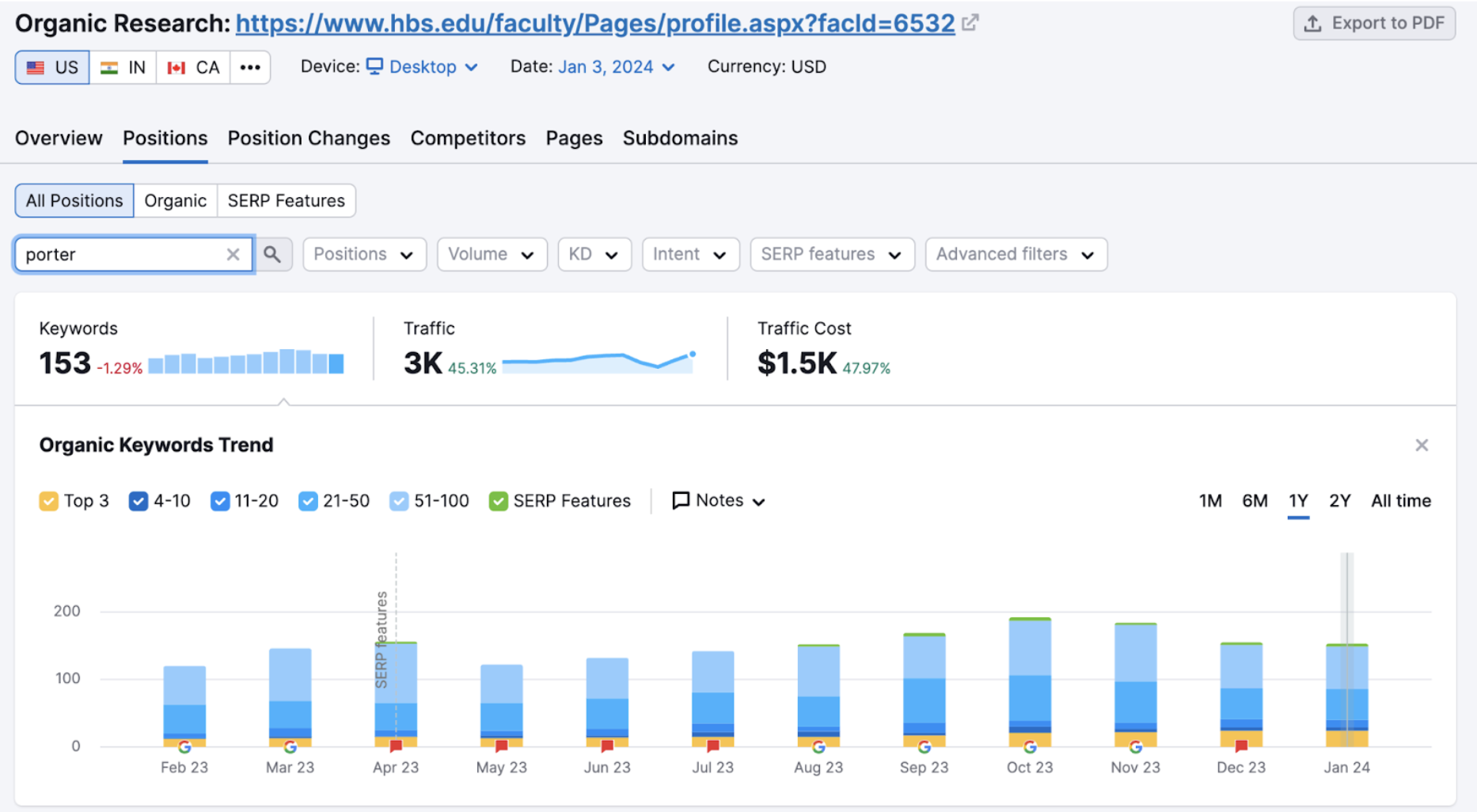 Screenshot from Semrush, January 2024
Screenshot from Semrush, January 2024
Hbs.edu benefits from this brand search in several ways:
- Expert reputation with Google: The brand search contributes to the reputation of the domain in Google.
- Connection to “business strategy”: Search engines see the website as more relevant to education and business topics, so the course pages can rank more easily.
- Improve school brand search: Students will search the school with the brand name “Harvard Business School” at various stages of the customer journey – thus further improving the website’s reputation with the search engines.
Google representatives have consistently stated that the expertise and reputation of the individuals and entities behind the website are key factors in ranking.
A strong signal of a site’s reputation is the search for brand names of the individuals and entities behind it.
The keyword “Michael Porter” has 12,100 average monthly searches as of the date of this article.
Links And Traffic
Porter’s page and other faculty KOLs drive the site’s reputation with links and traffic.
561 unique referring domains link to Michael’s faculty page on hbs.edu.
Although this is a small fraction of the total 28,700 referring domains, many of the professors at Harvard Business School are KOLs and contribute to the reputation of the school’s reputation.
Furthermore, according to Semrush, Porter’s page has a highly relevant link profile with placements on Forbes, Semrush, and Alibaba referencing his work.
-
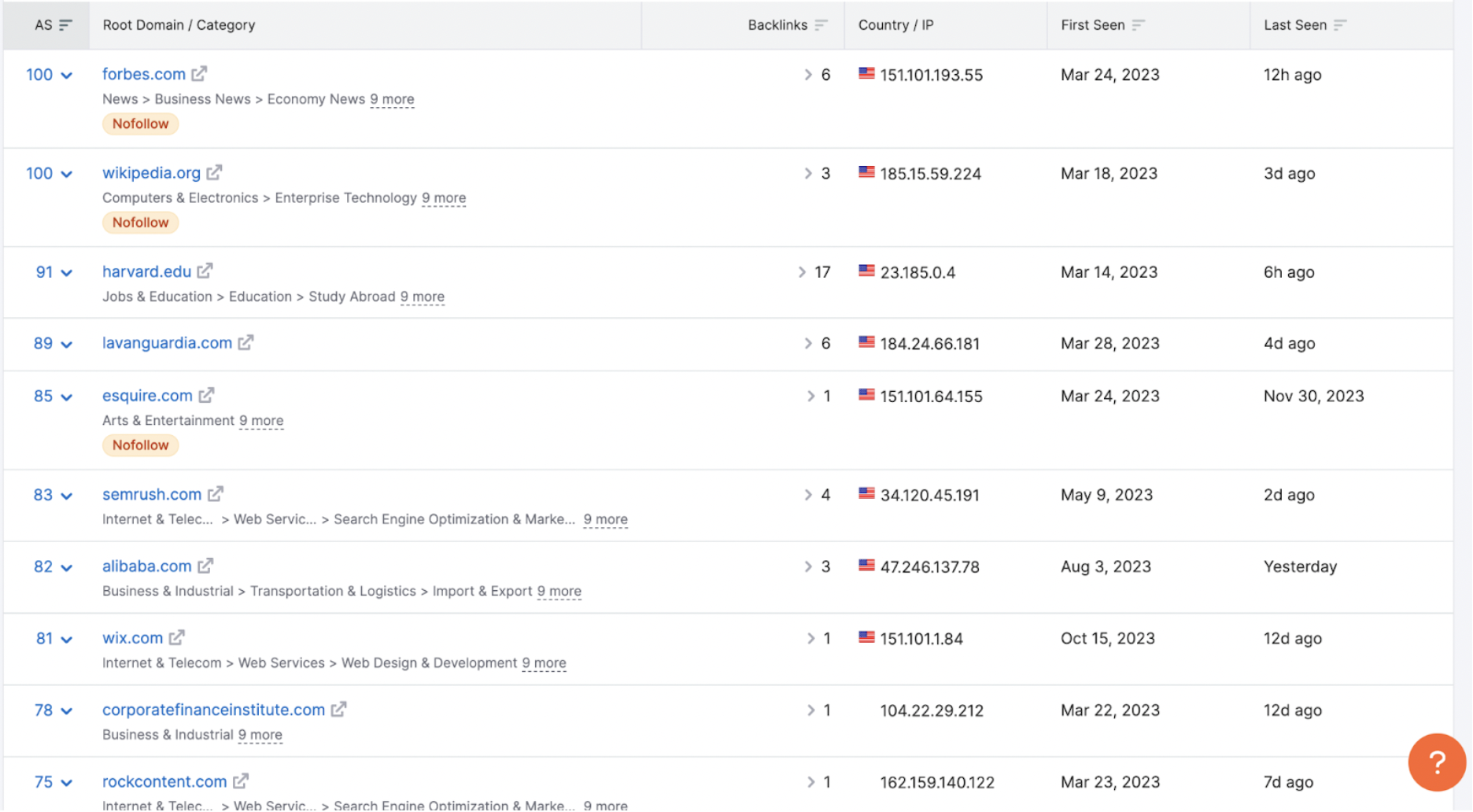 Screenshots from Semrush, January 2024
Screenshots from Semrush, January 2024
Overall, the SEO for hbs.edu is terrible since Harvard relies on brand over search for recruitment. But that’s another article.
Wrapping This Up
It’s clear that key opinion leaders like Michael E. Porter aren’t just experts in their fields – they’re game-changers.
Porter’s work at Harvard Business School is a great example of how a KOL can blend deep knowledge, research, and contribution with expert op-eds or guest articles to improve SEO.
This article is a call to action for anyone looking to make a real impact in their field and improve the value of search engines as a key marketing channel.
More resources:
Featured Image: Gearstd/Shutterstock
SEO
Google March 2024 Core Update Officially Completed A Week Ago
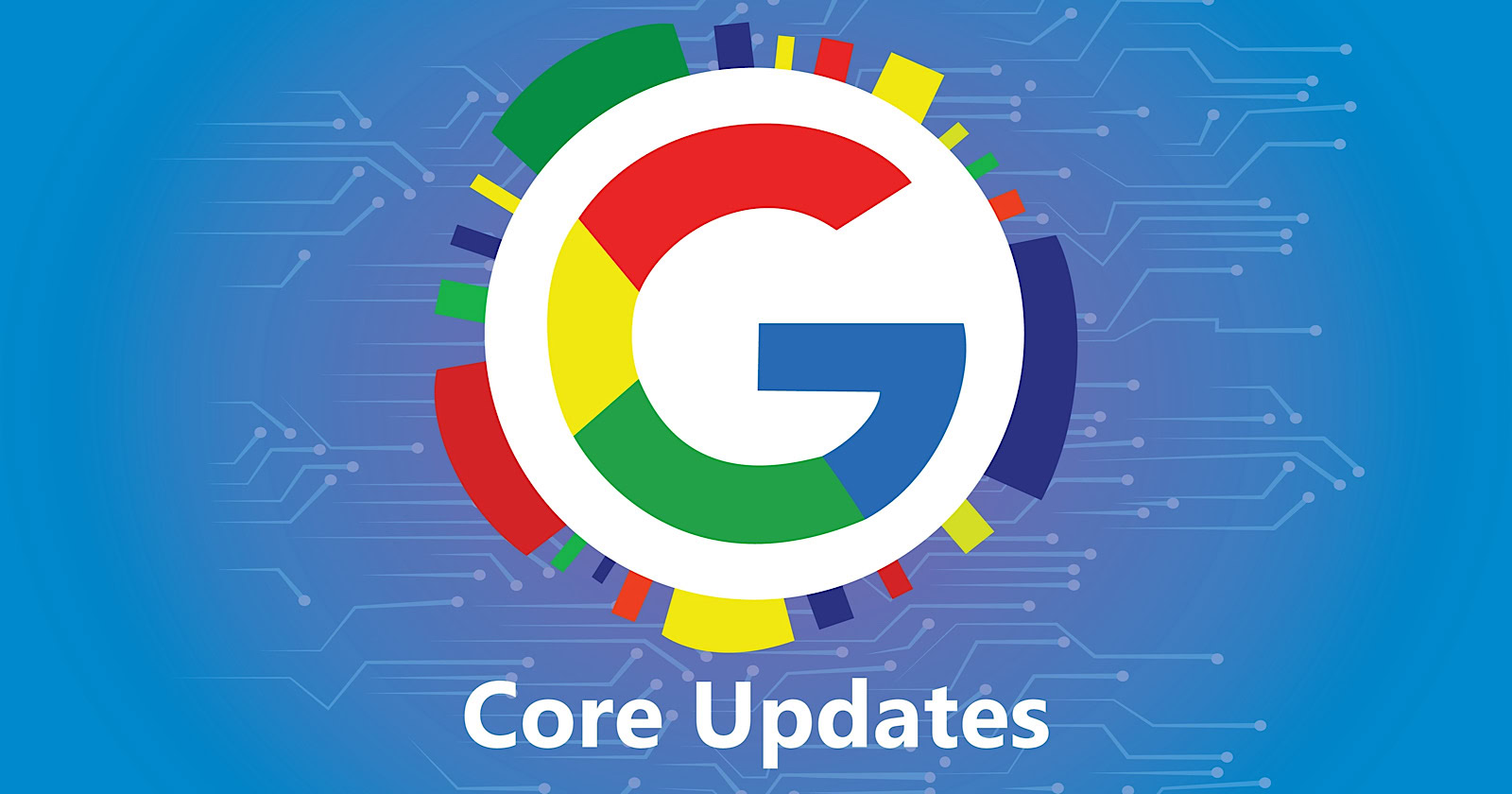
Google has officially completed its March 2024 Core Update, ending over a month of ranking volatility across the web.
However, Google didn’t confirm the rollout’s conclusion on its data anomaly page until April 26—a whole week after the update was completed on April 19.
Many in the SEO community had been speculating for days about whether the turbulent update had wrapped up.
The delayed transparency exemplifies Google’s communication issues with publishers and the need for clarity during core updates
Google March 2024 Core Update Timeline & Status
First announced on March 5, the core algorithm update is complete as of April 19. It took 45 days to complete.
Unlike more routine core refreshes, Google warned this one was more complex.
Google’s documentation reads:
“As this is a complex update, the rollout may take up to a month. It’s likely there will be more fluctuations in rankings than with a regular core update, as different systems get fully updated and reinforce each other.”
The aftershocks were tangible, with some websites reporting losses of over 60% of their organic search traffic, according to data from industry observers.
The ripple effects also led to the deindexing of hundreds of sites that were allegedly violating Google’s guidelines.
Addressing Manipulation Attempts
In its official guidance, Google highlighted the criteria it looks for when targeting link spam and manipulation attempts:
- Creating “low-value content” purely to garner manipulative links and inflate rankings.
- Links intended to boost sites’ rankings artificially, including manipulative outgoing links.
- The “repurposing” of expired domains with radically different content to game search visibility.
The updated guidelines warn:
“Any links that are intended to manipulate rankings in Google Search results may be considered link spam. This includes any behavior that manipulates links to your site or outgoing links from your site.”
John Mueller, a Search Advocate at Google, responded to the turbulence by advising publishers not to make rash changes while the core update was ongoing.
However, he suggested sites could proactively fix issues like unnatural paid links.
“If you have noticed things that are worth improving on your site, I’d go ahead and get things done. The idea is not to make changes just for search engines, right? Your users will be happy if you can make things better even if search engines haven’t updated their view of your site yet.”
Emphasizing Quality Over Links
The core update made notable changes to how Google ranks websites.
Most significantly, Google reduced the importance of links in determining a website’s ranking.
In contrast to the description of links as “an important factor in determining relevancy,” Google’s updated spam policies stripped away the “important” designation, simply calling links “a factor.”
This change aligns with Google’s Gary Illyes’ statements that links aren’t among the top three most influential ranking signals.
Instead, Google is giving more weight to quality, credibility, and substantive content.
Consequently, long-running campaigns favoring low-quality link acquisition and keyword optimizations have been demoted.
With the update complete, SEOs and publishers are left to audit their strategies and websites to ensure alignment with Google’s new perspective on ranking.
Core Update Feedback
Google has opened a ranking feedback form related to this core update.
You can use this form until May 31 to provide feedback to Google’s Search team about any issues noticed after the core update.
While the feedback provided won’t be used to make changes for specific queries or websites, Google says it may help inform general improvements to its search ranking systems for future updates.
Google also updated its help documentation on “Debugging drops in Google Search traffic” to help people understand ranking changes after a core update.
Featured Image: Rohit-Tripathi/Shutterstock
FAQ
After the update, what steps should websites take to align with Google’s new ranking criteria?
After Google’s March 2024 Core Update, websites should:
- Improve the quality, trustworthiness, and depth of their website content.
- Stop heavily focusing on getting as many links as possible and prioritize relevant, high-quality links instead.
- Fix any shady or spam-like SEO tactics on their sites.
- Carefully review their SEO strategies to ensure they follow Google’s new guidelines.
SEO
Google Declares It The “Gemini Era” As Revenue Grows 15%

Alphabet Inc., Google’s parent company, announced its first quarter 2024 financial results today.
While Google reported double-digit growth in key revenue areas, the focus was on its AI developments, dubbed the “Gemini era” by CEO Sundar Pichai.
The Numbers: 15% Revenue Growth, Operating Margins Expand
Alphabet reported Q1 revenues of $80.5 billion, a 15% increase year-over-year, exceeding Wall Street’s projections.
Net income was $23.7 billion, with diluted earnings per share of $1.89. Operating margins expanded to 32%, up from 25% in the prior year.
Ruth Porat, Alphabet’s President and CFO, stated:
“Our strong financial results reflect revenue strength across the company and ongoing efforts to durably reengineer our cost base.”
Google’s core advertising units, such as Search and YouTube, drove growth. Google advertising revenues hit $61.7 billion for the quarter.
The Cloud division also maintained momentum, with revenues of $9.6 billion, up 28% year-over-year.
Pichai highlighted that YouTube and Cloud are expected to exit 2024 at a combined $100 billion annual revenue run rate.
Generative AI Integration in Search
Google experimented with AI-powered features in Search Labs before recently introducing AI overviews into the main search results page.
Regarding the gradual rollout, Pichai states:
“We are being measured in how we do this, focusing on areas where gen AI can improve the Search experience, while also prioritizing traffic to websites and merchants.”
Pichai reports that Google’s generative AI features have answered over a billion queries already:
“We’ve already served billions of queries with our generative AI features. It’s enabling people to access new information, to ask questions in new ways, and to ask more complex questions.”
Google reports increased Search usage and user satisfaction among those interacting with the new AI overview results.
The company also highlighted its “Circle to Search” feature on Android, which allows users to circle objects on their screen or in videos to get instant AI-powered answers via Google Lens.
Reorganizing For The “Gemini Era”
As part of the AI roadmap, Alphabet is consolidating all teams building AI models under the Google DeepMind umbrella.
Pichai revealed that, through hardware and software improvements, the company has reduced machine costs associated with its generative AI search results by 80% over the past year.
He states:
“Our data centers are some of the most high-performing, secure, reliable and efficient in the world. We’ve developed new AI models and algorithms that are more than one hundred times more efficient than they were 18 months ago.
How Will Google Make Money With AI?
Alphabet sees opportunities to monetize AI through its advertising products, Cloud offerings, and subscription services.
Google is integrating Gemini into ad products like Performance Max. The company’s Cloud division is bringing “the best of Google AI” to enterprise customers worldwide.
Google One, the company’s subscription service, surpassed 100 million paid subscribers in Q1 and introduced a new premium plan featuring advanced generative AI capabilities powered by Gemini models.
Future Outlook
Pichai outlined six key advantages positioning Alphabet to lead the “next wave of AI innovation”:
- Research leadership in AI breakthroughs like the multimodal Gemini model
- Robust AI infrastructure and custom TPU chips
- Integrating generative AI into Search to enhance the user experience
- A global product footprint reaching billions
- Streamlined teams and improved execution velocity
- Multiple revenue streams to monetize AI through advertising and cloud
With upcoming events like Google I/O and Google Marketing Live, the company is expected to share further updates on its AI initiatives and product roadmap.
Featured Image: Sergei Elagin/Shutterstock
SEO
brightonSEO Live Blog

Hello everyone. It’s April again, so I’m back in Brighton for another two days of Being the introvert I am, my idea of fun isn’t hanging around our booth all day explaining we’ve run out of t-shirts (seriously, you need to be fast if you want swag!). So I decided to do something useful and live-blog the event instead.
Follow below for talk takeaways and (very) mildly humorous commentary. sun, sea, and SEO!
-
SEARCHENGINES7 days ago
Daily Search Forum Recap: April 19, 2024
-

 WORDPRESS7 days ago
WORDPRESS7 days ago7 Best WooCommerce Points and Rewards Plugins (Free & Paid)
-

 MARKETING7 days ago
MARKETING7 days agoBattling for Attention in the 2024 Election Year Media Frenzy
-

 WORDPRESS6 days ago
WORDPRESS6 days ago13 Best HubSpot Alternatives for 2024 (Free + Paid)
-

 MARKETING6 days ago
MARKETING6 days agoAdvertising in local markets: A playbook for success
-

 SEO7 days ago
SEO7 days agoGoogle Answers Whether Having Two Sites Affects Rankings
-

 SEARCHENGINES6 days ago
SEARCHENGINES6 days agoGoogle Core Update Flux, AdSense Ad Intent, California Link Tax & More
-

 AFFILIATE MARKETING7 days ago
AFFILIATE MARKETING7 days agoGrab Microsoft Project Professional 2021 for $20 During This Flash Sale





![The Current State of Google’s Search Generative Experience [What It Means for SEO in 2024] person typing on laptop with](https://articles.entireweb.com/wp-content/uploads/2024/04/The-Current-State-of-Googles-Search-Generative-Experience-What-It.webp-400x240.webp)
![The Current State of Google’s Search Generative Experience [What It Means for SEO in 2024] person typing on laptop with](https://articles.entireweb.com/wp-content/uploads/2024/04/The-Current-State-of-Googles-Search-Generative-Experience-What-It.webp-80x80.webp)









